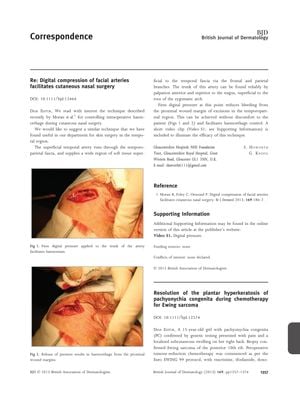Resolution of Plantar Hyperkeratosis of Pachyonychia Congenita During Chemotherapy for Ewing Sarcoma
August 2013
in “
British Journal of Dermatology
”

TLDR Chemotherapy improved a girl's painful foot condition linked to pachyonychia congenita.
A 15-year-old girl with pachyonychia congenita (PC) and a keratin 16 mutation experienced significant improvement in her painful plantar keratoderma during chemotherapy for Ewing sarcoma. The chemotherapy regimen included vincristine, ifosfamide (later replaced by cyclophosphamide), doxorubicin, and etoposide. Six weeks into treatment, large areas of hyperkeratotic plaques began shedding, with marked improvement by 12 weeks and near-complete resolution by 16 weeks. This improvement persisted for 9 months post-chemotherapy. The exact mechanism is unclear but may involve an antiproliferative effect similar to chemotherapy-induced alopecia. This observation suggests a potential hyperproliferative component in PC and highlights the need for further research to harness this effect safely.






